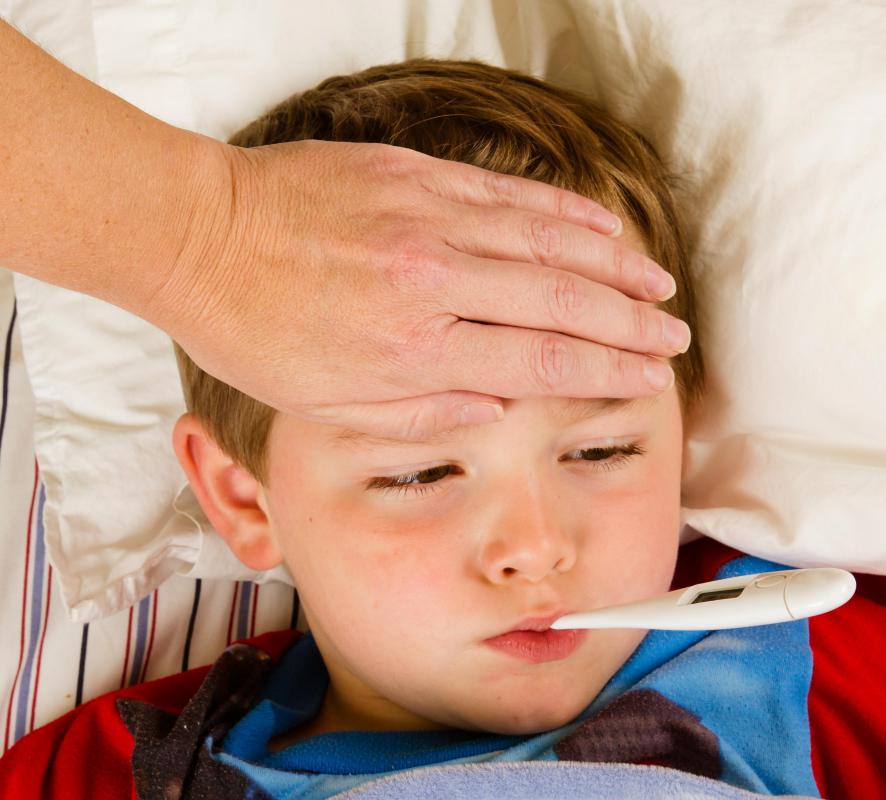At WiseGEEK, we're committed to delivering accurate, trustworthy information. Our expert-authored content is rigorously fact-checked and sourced from credible authorities. Discover how we uphold the highest standards in providing you with reliable knowledge.
What are Growing Pains?
Growing pains are pains that may occur in children during the ages of 3-5 and 8-12. They often manifest as pain in the legs, or painful cramping of the muscles around the thighs, the calves or the shins. Actually, most doctors don’t believe that growing pains are associated with growing. Instead they suggest that growing pains are muscle exhaustion from kids playing hard during the day.
However, growing pains normally stop after growth periods stop. They become far less common after children have stopped growing. Further children seem more susceptible to these pains during rapid growth spurts.

Generally growing pains occur late in the day or sometimes in the middle of the night. They may affect one or both legs. If they are accompanied by fever, they may not be growing pains but may indicate others sorts of illness. Also if they occur with great frequency, it is probably best to get a doctor’s advice regarding them. Sometimes the early stages of conditions like rheumatoid arthritis can be dismissed as growing pains. As well, pain associated with fever may indicate injury to the leg or the beginnings of influenza.

When other conditions have been ruled out, or when growing pains are infrequent, a few things can help make a child more comfortable. If the pains occur late in the day, a warm bath can help alleviate cramping. As well, ibuprofen or acetaminophen may help alleviate the pain associated with cramped muscles.
A child can also use a heating pad but this is generally recommended for older children only who are under supervision. Especially in the middle of the night, if a parent or child forgets to turn off a heating pad, the child could suffer accidental burning of the child’s sensitive skin.
Giving ibuprofen at night may head off growing pains, according to some doctors. This advice should be taken only under a doctor’s care because there are some risks associated with consistent use of pain medication.

However, if a child is occasionally subject to growing pains and has played very hard during the day, the occasional use of ibuprofen or acetaminophen at bedtime might help eliminate cramping at night. This use should only be sporadic and should not exceed more than a couple of days in succession, unless one is otherwise directed by a physician.
AS FEATURED ON:
AS FEATURED ON:













Discussion Comments
@pleonasm - I've never realized that there was a real condition called growing pains. I always thought it was just a reference to the emotional trials of growing up, rather than to literal pain. It was the kind of thing my parents would say when one of us had a tantrum or was miserable over something at school, that we just had growing pains.
@Mor - Just be careful that both you and your child know and trust each other enough to know when something is serious. You don't want to dismiss an ache as growing pains and then find out it was appendicitis or something like that.
An easy check is whether they have a fever or other symptoms like swelling around where they are sore. If it is hot or swollen or they seem feverish then you should give them an anti-inflammatory and see if that helps. If it continues for more than a day or starts getting worse then absolutely get them to the doctor.
But kids do have various aches and pains while growing up that just come and go and may never have an explanation.
It's difficult to know how seriously to treat things like growing pains. I tend to try and just be practical about it. You don't want to make too much of a fuss over something that is probably going to be gone by morning, but you also don't want your child to think you don't care.
I've worked with children whose parents acted like every little scrape and sore muscle was a crisis and they quickly learn to treat them like that as well. But if the adults around them just treat it as another part of life they will too.
So be kind, but practical. Offer them rest and compresses and things like that, but don't rush them to the doctor or anything.
Post your comments